By: Shara Jeyarajah
As SMU approaches its second week of class, there are two options to guarantee the SMU students will take COVID-19 seriously. First, students can heed the stream of information coming from the media, our well-meaning provosts, and student leaders. Second, a student can witness the infection of a loved one due to COVID-19.
Back in May, I wholeheartedly planned to return to campus. SMU fostered a space conducive to personal and academic breakthroughs, and I felt my progress stall at home. Like anyone else, worries about elderly family members prickled in the back of my mind. However, as a human rights student, the issues raised by police violence, SMU’s latest reckoning with anti-Blackness, and the politicization of pandemic safety buried my personal worries.
My grandfather, who I call Papa, had an unexpected fall on June 4. My mom traveled to Austin to visit her declining dad and anxious mom, my grandmother. As days turned to weeks, she urged my siblings and I to drive down from Dallas to exchange final words. For several weekends in a row, we masked up and watched Papa’s sharp decline from a distance. We tried to prevent our emotions from superseding the threat posed by COVID-19; we occasionally failed. On June 27, Papa extended a blessing and prayer to each member of my family. The next Saturday, July 4, some family members swung by the house to say a final goodbye. On Sunday, Papa started coughing. Over the following week, my mom, grandfather, and grandmother tested positive for coronavirus.
My family understood the dangers posed by the virus to our at-risk grandparents. However, because grieving is a group activity, there were justifiable moments of negligence. Juggling the sting of Papa’s final days and the pandemic, our missteps caused a nightmare scenario. Nothing could prepare me to FaceTime my unresponsive Papa in hospice; to call Mom, unsure of whether to address Papa’s death or her health first; to receive a passing text that my great aunt, Papa’s sister, who also died due to COVID-19; to plant meals and sympathy cards outside Mom’s bedroom door; and to hold an outdoor August funeral. Mom and Grandma recovered, but I was fearful that my maskless Bible reading could cause another wave of harm. Is retracing our steps to pinpoint the moment Papa contracted the virus a form of processing?
My family operated with the best intentions for one another, yet we still failed to contain the virus.
I did not return to campus for the fall. While the university should be responsible for the safety and welfare of the community, SMU opted to stand on the wrong side of history, shifting the responsibility of outbreak prevention onto students. I ask students returning to campus to read my experiences as a case study clarifying the stakes complacency towards the virus. Exercise compassion to your professors, faculty, and staff by holding your peers accountable to mask-wearing and social distancing protocols. A momentary lapse in judgment can cause irreparable damage— do not take it for granted.
Shara Jeyarajah is a third-year President’s Scholar majoring in Human Rights and Music. Shara’s unique academic background informs her ability to address systemic issues with creative solutions. As an SMU Human Rights Fellow, Shara is developing a podcast about the history of SMU through a racial justice lens.
The Daily Campus welcomes opinion contributions from students, faculty and community members. Submissions should be no more than 1000 words and are subject to copy editing. Please email submissions to smudailycampus@gmail.com, and include a cell phone number and a short biography. All pieces submitted to and published by The Daily Campus are under the publishing and editorial purview of the paper once published.









